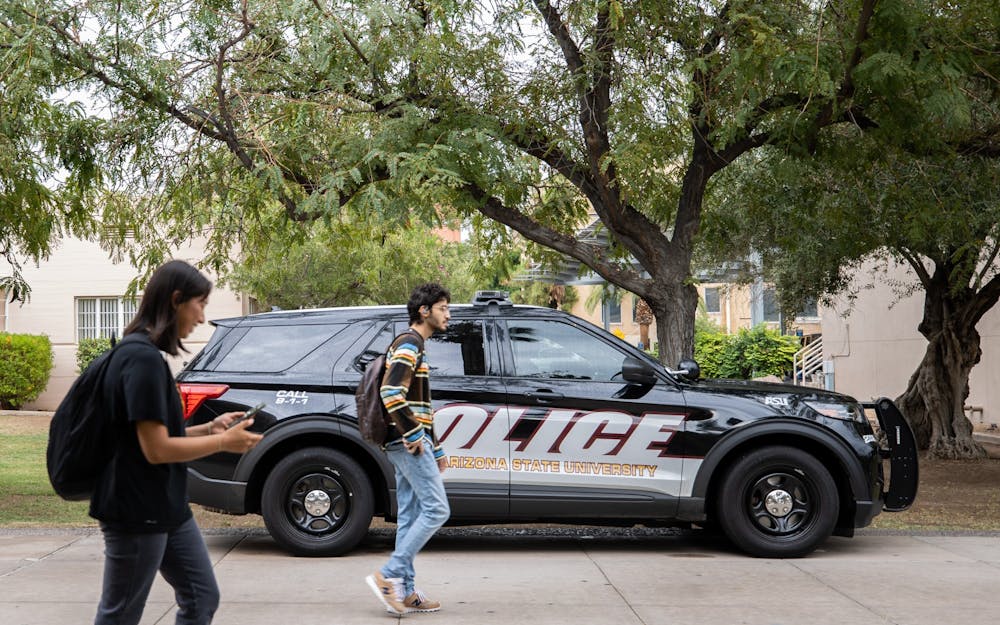Many campus police departments are created for students and police to interact in ways more conducive to student safety, but the ASU Police Department still lacks the necessary resources to support student safety beyond policing crime.
On-campus police officers are thought to better serve their student communities than local police departments, because they are especially concerned with student safety. This may be the case at some universities, but it is worthwhile to address how ASU can better help students in situations that may not always need to involve ASU PD response.
In order to better serve student communities, many campus police departments tend to adopt harm reduction models.
Harm reduction models encompass many different types of programs, but some of the ones relevant to student communities involve drug checking, overdose prevention and reversal, psychosocial support and the provision of information on safer drug use, according to Harm Reduction International.
In 2019, Tempe initiated a program for police to respond to drug overdoses that integrates social workers, peer counselors from EMPACT and other crisis response professionals.
According to Public Health Post, the Tempe First-Responder Opioid Recovery Project has yielded promising results, saving 129 lives due to officers administering naloxone, a medicine intended to reverse an opioid overdose, as of August 2021. The program also saw 116 survivors and their loved ones be connected to addiction recovery services within the first two years of its initiation.
Based on the success of this project, ASU should consider developing a similar response to drug-related emergencies on campus. According to ASU PD spokesperson Adam Wolfe, there is "no official policy" to connect people to resources in ASU PD's drug response.
One policy that ASU could employ is to make overdose prevention kits, which contain medicines like naloxone, easily accessible on campus. This response should also provide mental health services, as it is often related to drug use and overdose.
Other than drug response, police responses to mental health crises are also often found ineffective. Mapping Police Violence reported that in 2021, 101 people were killed in the U.S. after police responded to reports of mental health crises or someone behaving erratically.
When presented with the dilemma of police being unqualified to respond to mental health crises, harm reductionist models call for easy accessibility to healthcare, social services and treatment.
In January 2022, the city of Tempe adopted a new model that dispatches mental health professionals instead of police officers in emergencies involving suicide or self-harm, so long as the person in crisis is unarmed and non-violent, according to a city of Tempe press release. 911 dispatchers work alongside Solari Crisis and Human Services mental health professionals to determine when CARE 7, Tempe's crisis response unit, should be dispatched.
When asked if ASU PD follows a similar model to Tempe PD, Wolfe said police officers are always dispatched first and then decide the proper services needed on scene.
"If need be, we can send the CARE 7 team as well," Wolfe said.
Wolfe also said that earlier this year, ASU PD was focused on minimizing harm in the community and promoting peace through the Police2Peace project. The press release for the project said the project centers on de-escalation and peace, though it is "nothing new" for ASU PD.
The ASU community would benefit from modifying its current model to first send out mental health specialists when needed, or even more so, by requiring officers being required to attend cross-training sessions where they can learn more about things like trauma-informed response, crisis management and de-escalation skills.
Maya Swift, a junior studying psychology, said police response may be inappropriate in times of mental health crises. She said the response that comes from an "authoritative place" is intimidating for many people, which may cause officers to "lose connection with (their community)."
"Even being in a police uniform itself, you have a disconnect," Swift said.
Swift described how a fellow student she knew was met with a heavy police response after being deemed a danger to himself or others. Swift wonders whether that response was necessary.
"(Two of our friends) did a majority of the de-escalating before the police actually came," she said. "I feel like more than the response, the follow-up needs to be better with making sure somebody actually gets connected to the right resources."
Sending out behavioral health specialists and providing resources to the person in crisis is more appropriate than sending armed officers. ASU students should not be met with intimidation, especially in times of mental health crises.
While Tempe policing has attempted to adopt a more comprehensive policing model, ASU PD still seems to fall short in developing positive relations with students on campus.
Prioritizing a harm reductionist model as the primary response for drug and mental health emergencies would significantly benefit the ASU community by creating a more compassionate emergency response.
Edited by Sadie Buggle, Wyatt Myskow, Sophia Balasubramanian, Greta Forslund and Grace Copperthite.
Reach the columnist at haleighbell1026@gmail.com and follow @wwoodengirl on Twitter.
Editor's note: The opinions presented in this column are the author's and do not imply any endorsement from The State Press or its editors.
Want to join the conversation? Send an email to opiniondesk.statepress@gmail.com. Keep letters under 500 words and be sure to include your university affiliation. Anonymity will not be granted.
Like The State Press on Facebook and follow @statepress on Twitter.




